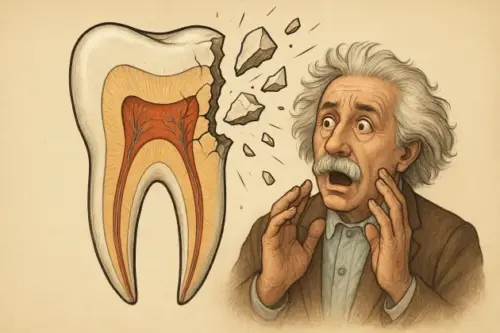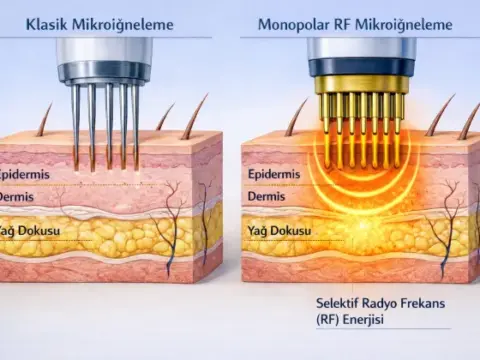Don't panic if your tooth breaks! You can save your day with quick and correct steps 😉
A fractured tooth is unexpected and distressing. However, with prompt and correct intervention, it's possible to save your tooth. The type and severity of the fracture significantly influence the treatment. In this article, we detail the steps you should take when experiencing a broken tooth, how to protect the broken pieces, potential complications, and, most importantly, when to see a dentist. Remember, early intervention minimizes the risk of tooth loss and protects your oral health.


Life can be filled with unexpected moments, and a broken tooth is one of them. Many factors, such as biting into hard food, having an accident, or unconsciously clenching our teeth, can compromise the integrity of our teeth and lead to a fracture. When faced with such a situation, many questions will come to mind: "What should I do now?", "Can my tooth be saved?", "Will it relieve the pain?". In this article, we will explain everything you need to know about a broken tooth, from what to do in the event of a broken tooth to the treatment options available, all in detail at AuraDent.
What is Tooth Fracture and Why is it Important?
A tooth fracture is a crack, fracture, or fragmentation of the tooth's enamel, dentin, or both. Although teeth are among the hardest tissues in our bodies, they can break for a variety of reasons. A broken tooth not only presents an aesthetic problem but can also lead to more serious health problems, such as pain, sensitivity, and even infection. The type and depth of the fracture play a critical role in determining the urgency and method of treatment.
Types of Tooth Fractures and Their Importance
Tooth fractures can be classified in different ways, and each requires a specific treatment approach:
- Enamel Cracks: These are small cracks that occur only in the enamel layer on the outer surface of the tooth, are usually painless and barely visible. They may not require treatment, but they should be monitored for the risk of deepening over time.
- Enamel-Dentin Fractures: These fractures affect the enamel and the underlying dentin. They can often cause hot/cold sensitivity and pain. Depending on the size of the fracture, they can be repaired with treatments such as fillings, bonding, or crowns.
- Complicated Fractures (Fractures with Pulp Involvement): These are deep fractures that reach the pulp, the innermost layer of the tooth (where nerves and blood vessels are located). They carry severe pain, sensitivity to hot and cold, and the risk of infection. In such cases, root canal treatment may be necessary.
- Root Fractures: These are fractures that occur at the root of the tooth. Because they are usually located beneath the gum, they are difficult to detect from the outside and may require extraction.
- Vertical Root Fractures: A tooth fracture occurs vertically downward from the root. Tooth extraction is usually unavoidable.
The type of fracture directly impacts whether the tooth can be saved, the treatment method used, and the post-treatment recovery period. Therefore, accurate diagnosis and prompt intervention are crucial.
How to Store a Broken Tooth Piece?
If a piece of your tooth is broken off and you can find it, storing it properly will increase your dentist's chances of repairing your tooth. The broken piece can be glued back together or used as a guide. Here's what you need to do:
- Carefully pick up the broken piece and try to grasp it only by the top, not the root.
- Gently wash the part with clean water (do not scrub or rub).
- Store the broken piece in milk , saliva, or saline solution until you can get it to a dentist as soon as possible. These liquids help keep tooth cells alive. Water should be used as a last resort.
- Never leave it in a dry environment.
Swelling, Abscess Risk and Possibility of Complications
When a broken tooth is neglected, serious complications can occur:
- Pain and Sensitivity: If the fracture reaches the nerves of the tooth, severe pain and hot/cold sensitivity may be experienced.
- Infection and Abscess: Bacteria can infiltrate the tooth through the fracture line and cause infection. This can lead to an abscess formation at the root or in the surrounding tissues. An abscess presents with facial swelling, fever, and general discomfort.
- Tooth Loss: Deep fractures that remain untreated can result in complete tooth loss.
- Damage to Surrounding Teeth: The sharp edges of a broken tooth can injure your tongue, cheeks, or lips. Furthermore, the loss of chewing function caused by a broken tooth can overload other teeth, potentially damaging them.
To minimize these risks, immediate dental intervention is essential.
When Should You See a Dentist? Is Urgent Dentist Visit Necessary?
A broken tooth is always an emergency that should be evaluated by a dentist. Even if the fracture appears minor and painless, an underlying crack or damage to the enamel can lead to more serious problems. You should consult a dentist immediately , especially if:
- Severe or throbbing pain.
- Hypersensitivity to hot or cold foods/drinks.
- Swelling of the face or jaw.
- Fever or a general feeling of discomfort.
- Loss or swallowing of the broken piece.
- A visible opening or pit in the tooth.
At our AuraDent clinic, we prioritize urgent dental cases and offer modern treatment methods to restore your smile to its former health as quickly as possible.
Can a Tooth Be Saved Depending on the Fracture Type? The Importance of Early Intervention
Yes, depending on the type and severity of the fracture, the tooth can be saved. Early intervention is critical to preserving the vitality of the tooth and allowing it to repair without the need for more extensive treatment. The earlier the fracture is treated, the lower the risk of infection and the greater the chance of preserving the tooth's natural structure.
- Small Fractures (Limited to Enamel): Can usually be easily repaired with bonding (bonding with tooth-colored filling material) or a simple filling.
- Moderate Fractures (Enamel and Dentin): Can be restored with aesthetic solutions such as bonding, composite filling or porcelain laminate veneer (leaf porcelain).
- Large Fractures (Pulp Involvement): If the pulp is exposed, root canal treatment (endodontic treatment) may be necessary. Following root canal treatment, the tooth is strengthened with restorations such as fillings, crowns, or onlays/inlays.
- Root Fractures: Depending on the location and extent of the fracture, root canal treatment can sometimes stabilize the tooth. However, most root fractures require extraction and subsequent replacement with an implant or bridge.
AuraDent experts carefully evaluate each fracture case and present you with the most appropriate treatment plan to save your tooth.
Should a Broken Tooth Be Extracted?
Whether a broken tooth needs to be extracted depends on the severity of the fracture, the general condition of the tooth, the root structure, and the presence of infection. The basic principle in dentistry is to save the tooth whenever possible. However, in some cases, tooth extraction may be unavoidable:
- If the fracture line extends well below the root of the tooth.
- If the tooth has a large root fracture.
- If the tooth has an infection that is too serious to save and is not responding to treatment.
- If the tooth is damaged in a way that restoration is not possible.
Your dentist will make the most appropriate decision after a detailed examination and imaging studies (such as X-rays). If a tooth extraction is necessary, our AuraDent clinic can successfully restore the function and aesthetics of the lost tooth with modern dental prosthetics such as implants or bridges.
Seek Emergency Dentist Immediately: AuraDent is at Your Side
In emergencies like a broken tooth, time is of the essence. The chances of saving a tooth are directly proportional to the time it takes to intervene. Whether you're experiencing pain, sensitivity, or aesthetic concerns, delaying treatment for a broken tooth can worsen the situation. At AuraDent Aesthetic Clinic, we're here to provide fast and effective solutions to your emergency with our experienced dentists and state-of-the-art equipment. If you're concerned about your broken tooth, contact our clinic immediately and receive support from our expert team. Preserving your smile at its best is our priority!
Remember, regular checkups and proper oral hygiene also play a key role in preventing problems like tooth fractures. AuraDent is always here for you to achieve a healthy and beautiful smile!


